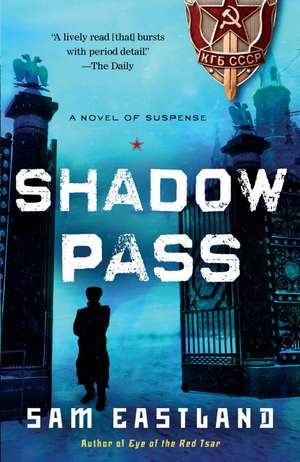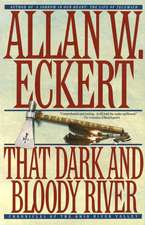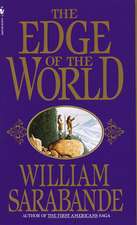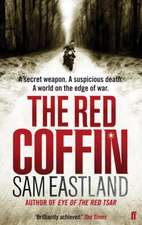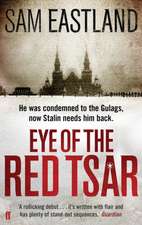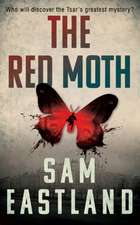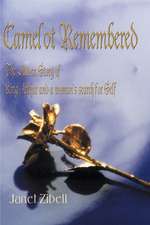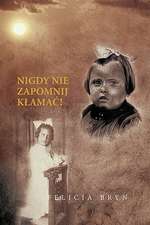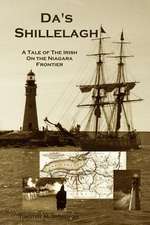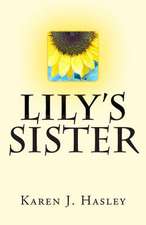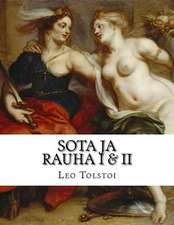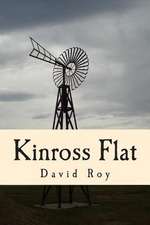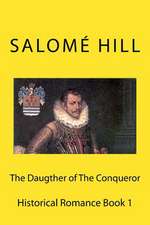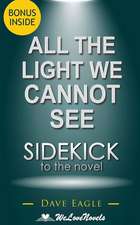Shadow Pass
Autor Sam Eastlanden Limba Engleză Paperback – 31 ian 2012
In the shadows of one of history’s most notorious regimes, Pekkala is on a collision course with not only the Soviet secret police but the USSR’s deadliest military secrets. For what he’s about to unearth could put Stalin and his Communist state under for good—and bury Pekkala with them.
Preț: 107.17 lei
Nou
Puncte Express: 161
Preț estimativ în valută:
20.51€ • 21.93$ • 17.10£
20.51€ • 21.93$ • 17.10£
Carte disponibilă
Livrare economică 27 martie-10 aprilie
Preluare comenzi: 021 569.72.76
Specificații
ISBN-13: 9780553593242
ISBN-10: 0553593242
Pagini: 309
Dimensiuni: 132 x 203 x 19 mm
Greutate: 0.35 kg
Editura: Bantam
ISBN-10: 0553593242
Pagini: 309
Dimensiuni: 132 x 203 x 19 mm
Greutate: 0.35 kg
Editura: Bantam
Notă biografică
Sam Eastland is the author of Eye of the Red Tsar. He is the grandson of a London Police detective who served in Scotland Yard’s famous “Ghost Squad” during the 1940s. He lives in the United States and Great Britain and is currently working on his next novel.
From the Hardcover edition.
From the Hardcover edition.
Extras
As the motorcycle crested the hill, sunlight winked off the goggles of the rider. Against the chill of early spring, he wore a double-breasted leather coat and a leather flying cap which buckled under his chin.
He had been on the road for three days, stopping only to buy fuel along the way. His saddlebags were filled with tins of food he'd brought from home.
At night, he did not stay in any town, but wheeled his motorcycle in among the trees. It was a new machine, a Zundapp K500, with a pressed-steel frame and girder forks. Normally he could never have afforded it, but this trip alone would pay for everything, and more besides. He thought about that as he sat there alone in the woods, eating cold soup from a can.
Before camouflaging the motorcycle with fallen branches, he wiped the dust from its sprung leather seat and the large teardrop-shaped fuel tank. He spat on every scratch he found and rubbed it with his sleeve.
The man slept on the ground, wrapped in an oilcloth sheet, without the comfort of a fire or even a cigarette. The smell of smoke might give away his location, and he could not afford to take the risk.
Sometimes, he was awakened by the rumble of Polish Army trucks passing by on the road. None of them stopped. Once he heard a crashing in among the trees. He drew a revolver from his coat and sat up just as a stag passed a few paces away, barely visible, as if the shadows themselves had come to life. For the rest of the night, the man did not sleep. Tormented by childhood nightmares of human shapes with antlers sprouting from their heads, he wanted only to be gone from this country. Ever since he crossed the German border into Poland, he had been afraid, although no one who saw him would ever have realized it. This was not the first time he had been on such a journey, and he knew from experience that his fear would not leave him until he was back among his own people again.
On the third day, he crossed into the Soviet Union at a lonely border checkpoint manned by one Polish soldier and one Russian soldier, neither of whom could speak the other's language. Both men came out to admire his motorcycle. "Zundapp," they crooned softly, as if saying the name of a loved one, and the man gritted his teeth while they ran their hands over the chrome.
A few minutes after leaving the checkpoint, he pulled over to the side of the road and raised the goggles to his forehead, revealing two pale moons of skin where the road dust had not settled on his face. Shielding his eyes with one hand, he looked out over the rolling countryside. The fields were plowed and muddy, seeds of rye and barley still sleeping in the ground. Thin feathers of smoke rose from the chimneys of solitary farmhouses, their slate roofs patched with luminous green moss.
The man wondered what the inhabitants of those houses might do if they knew their way of life would soon end. Even if they did know, he told himself, they would probably just carry on as they had always done, placing their faith in miracles. That, he thought, is precisely why they deserve to be extinct. The task he had come here to accomplish would bring that moment closer. After today, there would be nothing they could do to stop it. Then he wiped the fingerprints of the border guards off his handlebars and continued on his way.
He was close to the rendezvous point, racing along deserted roads, through patches of mist which clung to the hollows like ink diffusing in water. The words of half-remembered songs escaped his lips. Otherwise he did not speak, as if he were alone upon the earth. Driving out across that empty countryside, that was how he felt himself to be.
At last he came to the place he had been looking for. It was an abandoned farmhouse, roof sagging like the back of an old horse. Turning off the road, he drove the Zundapp through an opening in the stone wall which ringed the farmyard. Overgrown trees, sheathed with ivy, ringed the house. A flock of crows scattered from their branches, their ghostly shapes reflected in the puddles.
When he cut the engine, silence descended upon him. Removing his gauntlets, he scratched at the dried mud which had spattered his chin. It flaked away like scabs, revealing a week's growth of stubble beneath.
Shutters hung loose and rotten on the windows of the farmhouse. The door had been kicked in and lay flat on the floor inside the house. Dandelions grew between cracks in the floorboards.
He set the Zundapp on its kickstand, drew his gun, and stepped cautiously into the house. Holding the revolver down by his side, he trod across the creaking floorboards. Gray light filtered through the slits between the shutters. In the fireplace, a pair of dragon-headed andirons scowled at him as he walked by.
"There you are," said a voice.
The Zundapp rider flinched, but he did not raise the gun. He stood still, scanning the shadows. Then he spotted a man, sitting at a table in the next room, which had once been a kitchen. The stranger smiled, raised one hand and moved it slowly back and forth. "Nice motorcycle," he said.
The rider put away his gun and stepped into the kitchen.
"Right on time," said the man. Set on the table in front of him was a Tokarev automatic pistol and two small metal cups, each one no bigger than an eggshell. Beside the cups stood an unopened bottle of Georgian Ustashi vodka, a blue-green color from the steppe grass used to flavor it. The man had placed a second chair on the other side of the table so that the rider would have a place to sit. "How was your trip?" asked the man.
"Do you have it?" said the rider.
"Of course." The man reached into his coat and pulled out a bundle of documents which had been rolled up like a newspaper. He let them fall with a slap onto the table, raising a tiny cloud of dust from the dirty wooden surface.
"That's everything?" asked the rider.
The man patted the bundle reassuringly. "Full operational schematics for the entire Konstantin Project."
The rider put one foot on the chair and rolled up his trouser leg. Taped to his calf was a leather envelope. The man removed the tape, swearing quietly as it tore away the hair on his leg. Then he removed a stack of money from the envelope and laid it on the table. "Count it," said the Zundapp rider.
Obligingly, the man counted the money, walking the tips of his fingers through the bills.
Somewhere above them, in the rafters of the house, starlings trilled and clicked their beaks.
When the man had finished counting, he filled the two small cups with vodka and lifted one of them. "On behalf of the White Guild, I would like to thank you. A toast to the Guild and to the downfall of Communism!"
The rider did not reach for his cup. "Are we finished here?" he asked.
"Yes!" The man knocked back his vodka, then reached for the second cup, raised it in salute, and drank that, too. "I think we are finished."
The rider reached across and picked up the documents. As he tucked the bundle into the inside pocket of his coat, he paused to look around the room. He studied the canopies of spiderwebs, the puckered wallpaper, and the cracks which crazed the ceiling like the growth lines on a skull. You will be home soon, he thought. Then you can forget this ever happened.
"Would you care for a smoke?" asked the man. He laid a cigarette case on the table and set a brass lighter on top.
The rider stared at him, almost as if he knew this man from someplace before but could not remember where. "I should be going," he said.
The man smiled. "Maybe next time."
The rider turned away and started walking back towards his motorcycle.
He had gone only three paces when the man snatched up his Tokarev pistol, squinted down the line of his outstretched arm, and without getting up from the table, shot the rider in the back of the head. The bullet tore through the rider's skull and a piece of his forehead skittered away across the floor. He dropped to the ground like a puppet whose strings had been cut.
Now the man rose to his feet. He came out from behind the table and rolled the corpse over with his boot. The rider's arm swung out and his knuckles struck against the floor. The man bent down and removed the documents from the rider's pocket.
"You'll drink now, you fascist son of a bitch," he said. Then he took the bottle of vodka and emptied it out over the rider, soaking his head and shoulders and pouring a stream along the length of his legs. When the bottle was empty, he threw it away across the room. The heavy glass slammed against a rotten wall but did not break.
The man stashed the money and the documents in his pocket. Then he gathered up his gun, his little cups, and his box of cigarettes. On his way out of the house, he spun the metal wheel of his lighter and when the fire jumped up from the wick, he dropped the lighter on top of the dead man. The alcohol burst into flames with a sound like a curtain billowing in the wind.
The man walked out into the farmyard and stood before the motorcycle, trailing his fingers over the Zundapp name emblazoned on the fuel tank. Then he straddled the motorcycle and lifted the helmet and goggles from the place where they hung on the handlebars. He put on the helmet and settled the goggles over his eyes. The heat of the dead man's body was still in the leather eye pads. Kick-starting the motorcycle, he drove out onto the road and the Zundapp snarled as he shifted through the gears.
Behind him, already in the distance, a mushroom cloud of smoke rose from the blazing ruins of the farmhouse.
Officially, the Borodino restaurant, located in a quiet street just off the Bolotnaya Square in Moscow, was open to the public. Unofficially, the owner and headwaiter, a gaunt-faced man named Chicherin, would size up whoever came through the front door, its frosted glass panes decorated with a pattern of ivy leaves. Then Chicherin would either offer the patrons a table or direct them down a narrow, unlit corridor to what they assumed was a second dining room on the other side of the door. This would take them directly into an alley at the side of the restaurant. By the time they realized what had happened, the door would have locked automatically behind them. If the patrons still refused to take the hint and chose to come back into the restaurant, they would be confronted by the bartender, a former Greek wrestler named Niarchos, and ejected from the premises.
On a dreary afternoon in March, with clumps of dirty snow still clinging to the sunless corners of the city, a young man in a military uniform entered the Borodino. He was tall, with a narrow face, rosy cheeks, and a look of permanent curiosity. His smartly tailored gymnastyrka tunic fitted closely to his shoulders and his waist. He wore blue dress trousers with a red line of piping down the outside and knee-length black boots which glowed with a fresh coat of polish.
Chicherin scanned the uniform for any sign of elevated rank. Anything below the rank of captain was enough to qualify a soldier for a trip down the corridor to what Chicherin liked to call the Enchanted Grotto. Not only did this young man have no rank, he was not even wearing any insignia to denote his branch of service.
Chicherin was disgusted, but he smiled and said, "Good day," lowering his head slightly but not taking his eyes off the young man.
"Good day to you," came the reply. The man looked around at the full tables, admiring the plates of food. "Ah," he sighed. "Shashlik." He gestured towards a plate of fluffy white rice, on which a waiter was placing cubes of roast lamb, onions, and green peppers, carefully sliding them from the skewer on which they had been grilled. "Has the lamb been soaked in red wine"--he sniffed at the steam which drifted past his face--"or is it pomegranate juice?"
Chicherin narrowed his eyes. "Are you looking for a table?"
The young man did not seem to hear. "And there," he pointed. "Salmon with dill and horseradish sauce."
"Yes, that's right." Chicherin took him gently by the arm and steered him down the corridor. "This way, please."
"Down there?" The young man squinted into the dark tunnel of the corridor.
"Yes, yes," Chicherin reassured him. "The Enchanted Grotto."
Obediently, the young man disappeared into the alley.
A moment later, Chicherin heard the reassuring clunk of the metal door locking shut. Then came the helpless rattle of the doorknob as the young man tried to get back in.
Usually people took the hint, and Chicherin never saw them again. This time, however, when the young man reappeared less than a minute later, still smiling innocently, Chicherin nodded to Niarchos.
Niarchos was smearing a grubby-looking rag inside glasses used for serving tea. When he caught Chicherin's eye, he raised his head with a short, abrupt movement, like a horse trying to shake off its bridle. Then, very carefully, he set down the glass he had been polishing and came out from behind the bar.
"There seems to be some kind of mistake," said the young man. "My name is Kirov, and--"
"You should go," Niarchos interrupted. The Greek resented having to come out from behind the bar and lose the pleasant flow of daydreams as he mindlessly polished glasses.
"I think--" Kirov attempted once more to explain.
"Yes, yes," hissed Chicherin, appearing suddenly beside him, the smile having evaporated from his face. "Some kind of mistake, you say. But the only mistake is your coming in here. Can't you see that this is not the place for you?" He glanced out over the tables, populated mostly by jowly, red-faced men with grizzled hair. Some wore olive-brown gabardine tunics bearing the ranks of senior commissars. Others had civilian clothes, of European cut and good-quality wool, so finely woven that it seemed to shimmer beneath the orchid-shaped light fixtures. Sitting among these officers and politicians were beautiful but bored-looking women, sipping smoke from cork-tipped cigarettes. "Listen," said Chicherin, "even if you could get a table here, I doubt you could afford the meal."
"But I have not come to eat," protested Kirov. "Besides, I do my own cooking, and it looks to me as if your chef relies too heavily on his sauces."
Chicherin's forehead crumpled in confusion. "So you are looking for a job?"
"No," replied the young man. "I am looking for Colonel Nagorski."
Chicherin's eyes widened. He glanced towards a table in the corner of the room where two men were eating lunch. Both of the men wore suits. One was shaved bald, and the great dome of his head looked like a sphere of pink granite resting on the starched white pedestal of his shirt collar. The other man had thick black hair combed straight back on his head. The sharp angle of his cheekbones was offset by a slightly pointed beard cut close against his chin. This made him look as if his face had been stretched over an inverted triangle of wood, so tightly that even the slightest expression might tear the flesh from his bones.
From the Hardcover edition.
He had been on the road for three days, stopping only to buy fuel along the way. His saddlebags were filled with tins of food he'd brought from home.
At night, he did not stay in any town, but wheeled his motorcycle in among the trees. It was a new machine, a Zundapp K500, with a pressed-steel frame and girder forks. Normally he could never have afforded it, but this trip alone would pay for everything, and more besides. He thought about that as he sat there alone in the woods, eating cold soup from a can.
Before camouflaging the motorcycle with fallen branches, he wiped the dust from its sprung leather seat and the large teardrop-shaped fuel tank. He spat on every scratch he found and rubbed it with his sleeve.
The man slept on the ground, wrapped in an oilcloth sheet, without the comfort of a fire or even a cigarette. The smell of smoke might give away his location, and he could not afford to take the risk.
Sometimes, he was awakened by the rumble of Polish Army trucks passing by on the road. None of them stopped. Once he heard a crashing in among the trees. He drew a revolver from his coat and sat up just as a stag passed a few paces away, barely visible, as if the shadows themselves had come to life. For the rest of the night, the man did not sleep. Tormented by childhood nightmares of human shapes with antlers sprouting from their heads, he wanted only to be gone from this country. Ever since he crossed the German border into Poland, he had been afraid, although no one who saw him would ever have realized it. This was not the first time he had been on such a journey, and he knew from experience that his fear would not leave him until he was back among his own people again.
On the third day, he crossed into the Soviet Union at a lonely border checkpoint manned by one Polish soldier and one Russian soldier, neither of whom could speak the other's language. Both men came out to admire his motorcycle. "Zundapp," they crooned softly, as if saying the name of a loved one, and the man gritted his teeth while they ran their hands over the chrome.
A few minutes after leaving the checkpoint, he pulled over to the side of the road and raised the goggles to his forehead, revealing two pale moons of skin where the road dust had not settled on his face. Shielding his eyes with one hand, he looked out over the rolling countryside. The fields were plowed and muddy, seeds of rye and barley still sleeping in the ground. Thin feathers of smoke rose from the chimneys of solitary farmhouses, their slate roofs patched with luminous green moss.
The man wondered what the inhabitants of those houses might do if they knew their way of life would soon end. Even if they did know, he told himself, they would probably just carry on as they had always done, placing their faith in miracles. That, he thought, is precisely why they deserve to be extinct. The task he had come here to accomplish would bring that moment closer. After today, there would be nothing they could do to stop it. Then he wiped the fingerprints of the border guards off his handlebars and continued on his way.
He was close to the rendezvous point, racing along deserted roads, through patches of mist which clung to the hollows like ink diffusing in water. The words of half-remembered songs escaped his lips. Otherwise he did not speak, as if he were alone upon the earth. Driving out across that empty countryside, that was how he felt himself to be.
At last he came to the place he had been looking for. It was an abandoned farmhouse, roof sagging like the back of an old horse. Turning off the road, he drove the Zundapp through an opening in the stone wall which ringed the farmyard. Overgrown trees, sheathed with ivy, ringed the house. A flock of crows scattered from their branches, their ghostly shapes reflected in the puddles.
When he cut the engine, silence descended upon him. Removing his gauntlets, he scratched at the dried mud which had spattered his chin. It flaked away like scabs, revealing a week's growth of stubble beneath.
Shutters hung loose and rotten on the windows of the farmhouse. The door had been kicked in and lay flat on the floor inside the house. Dandelions grew between cracks in the floorboards.
He set the Zundapp on its kickstand, drew his gun, and stepped cautiously into the house. Holding the revolver down by his side, he trod across the creaking floorboards. Gray light filtered through the slits between the shutters. In the fireplace, a pair of dragon-headed andirons scowled at him as he walked by.
"There you are," said a voice.
The Zundapp rider flinched, but he did not raise the gun. He stood still, scanning the shadows. Then he spotted a man, sitting at a table in the next room, which had once been a kitchen. The stranger smiled, raised one hand and moved it slowly back and forth. "Nice motorcycle," he said.
The rider put away his gun and stepped into the kitchen.
"Right on time," said the man. Set on the table in front of him was a Tokarev automatic pistol and two small metal cups, each one no bigger than an eggshell. Beside the cups stood an unopened bottle of Georgian Ustashi vodka, a blue-green color from the steppe grass used to flavor it. The man had placed a second chair on the other side of the table so that the rider would have a place to sit. "How was your trip?" asked the man.
"Do you have it?" said the rider.
"Of course." The man reached into his coat and pulled out a bundle of documents which had been rolled up like a newspaper. He let them fall with a slap onto the table, raising a tiny cloud of dust from the dirty wooden surface.
"That's everything?" asked the rider.
The man patted the bundle reassuringly. "Full operational schematics for the entire Konstantin Project."
The rider put one foot on the chair and rolled up his trouser leg. Taped to his calf was a leather envelope. The man removed the tape, swearing quietly as it tore away the hair on his leg. Then he removed a stack of money from the envelope and laid it on the table. "Count it," said the Zundapp rider.
Obligingly, the man counted the money, walking the tips of his fingers through the bills.
Somewhere above them, in the rafters of the house, starlings trilled and clicked their beaks.
When the man had finished counting, he filled the two small cups with vodka and lifted one of them. "On behalf of the White Guild, I would like to thank you. A toast to the Guild and to the downfall of Communism!"
The rider did not reach for his cup. "Are we finished here?" he asked.
"Yes!" The man knocked back his vodka, then reached for the second cup, raised it in salute, and drank that, too. "I think we are finished."
The rider reached across and picked up the documents. As he tucked the bundle into the inside pocket of his coat, he paused to look around the room. He studied the canopies of spiderwebs, the puckered wallpaper, and the cracks which crazed the ceiling like the growth lines on a skull. You will be home soon, he thought. Then you can forget this ever happened.
"Would you care for a smoke?" asked the man. He laid a cigarette case on the table and set a brass lighter on top.
The rider stared at him, almost as if he knew this man from someplace before but could not remember where. "I should be going," he said.
The man smiled. "Maybe next time."
The rider turned away and started walking back towards his motorcycle.
He had gone only three paces when the man snatched up his Tokarev pistol, squinted down the line of his outstretched arm, and without getting up from the table, shot the rider in the back of the head. The bullet tore through the rider's skull and a piece of his forehead skittered away across the floor. He dropped to the ground like a puppet whose strings had been cut.
Now the man rose to his feet. He came out from behind the table and rolled the corpse over with his boot. The rider's arm swung out and his knuckles struck against the floor. The man bent down and removed the documents from the rider's pocket.
"You'll drink now, you fascist son of a bitch," he said. Then he took the bottle of vodka and emptied it out over the rider, soaking his head and shoulders and pouring a stream along the length of his legs. When the bottle was empty, he threw it away across the room. The heavy glass slammed against a rotten wall but did not break.
The man stashed the money and the documents in his pocket. Then he gathered up his gun, his little cups, and his box of cigarettes. On his way out of the house, he spun the metal wheel of his lighter and when the fire jumped up from the wick, he dropped the lighter on top of the dead man. The alcohol burst into flames with a sound like a curtain billowing in the wind.
The man walked out into the farmyard and stood before the motorcycle, trailing his fingers over the Zundapp name emblazoned on the fuel tank. Then he straddled the motorcycle and lifted the helmet and goggles from the place where they hung on the handlebars. He put on the helmet and settled the goggles over his eyes. The heat of the dead man's body was still in the leather eye pads. Kick-starting the motorcycle, he drove out onto the road and the Zundapp snarled as he shifted through the gears.
Behind him, already in the distance, a mushroom cloud of smoke rose from the blazing ruins of the farmhouse.
Officially, the Borodino restaurant, located in a quiet street just off the Bolotnaya Square in Moscow, was open to the public. Unofficially, the owner and headwaiter, a gaunt-faced man named Chicherin, would size up whoever came through the front door, its frosted glass panes decorated with a pattern of ivy leaves. Then Chicherin would either offer the patrons a table or direct them down a narrow, unlit corridor to what they assumed was a second dining room on the other side of the door. This would take them directly into an alley at the side of the restaurant. By the time they realized what had happened, the door would have locked automatically behind them. If the patrons still refused to take the hint and chose to come back into the restaurant, they would be confronted by the bartender, a former Greek wrestler named Niarchos, and ejected from the premises.
On a dreary afternoon in March, with clumps of dirty snow still clinging to the sunless corners of the city, a young man in a military uniform entered the Borodino. He was tall, with a narrow face, rosy cheeks, and a look of permanent curiosity. His smartly tailored gymnastyrka tunic fitted closely to his shoulders and his waist. He wore blue dress trousers with a red line of piping down the outside and knee-length black boots which glowed with a fresh coat of polish.
Chicherin scanned the uniform for any sign of elevated rank. Anything below the rank of captain was enough to qualify a soldier for a trip down the corridor to what Chicherin liked to call the Enchanted Grotto. Not only did this young man have no rank, he was not even wearing any insignia to denote his branch of service.
Chicherin was disgusted, but he smiled and said, "Good day," lowering his head slightly but not taking his eyes off the young man.
"Good day to you," came the reply. The man looked around at the full tables, admiring the plates of food. "Ah," he sighed. "Shashlik." He gestured towards a plate of fluffy white rice, on which a waiter was placing cubes of roast lamb, onions, and green peppers, carefully sliding them from the skewer on which they had been grilled. "Has the lamb been soaked in red wine"--he sniffed at the steam which drifted past his face--"or is it pomegranate juice?"
Chicherin narrowed his eyes. "Are you looking for a table?"
The young man did not seem to hear. "And there," he pointed. "Salmon with dill and horseradish sauce."
"Yes, that's right." Chicherin took him gently by the arm and steered him down the corridor. "This way, please."
"Down there?" The young man squinted into the dark tunnel of the corridor.
"Yes, yes," Chicherin reassured him. "The Enchanted Grotto."
Obediently, the young man disappeared into the alley.
A moment later, Chicherin heard the reassuring clunk of the metal door locking shut. Then came the helpless rattle of the doorknob as the young man tried to get back in.
Usually people took the hint, and Chicherin never saw them again. This time, however, when the young man reappeared less than a minute later, still smiling innocently, Chicherin nodded to Niarchos.
Niarchos was smearing a grubby-looking rag inside glasses used for serving tea. When he caught Chicherin's eye, he raised his head with a short, abrupt movement, like a horse trying to shake off its bridle. Then, very carefully, he set down the glass he had been polishing and came out from behind the bar.
"There seems to be some kind of mistake," said the young man. "My name is Kirov, and--"
"You should go," Niarchos interrupted. The Greek resented having to come out from behind the bar and lose the pleasant flow of daydreams as he mindlessly polished glasses.
"I think--" Kirov attempted once more to explain.
"Yes, yes," hissed Chicherin, appearing suddenly beside him, the smile having evaporated from his face. "Some kind of mistake, you say. But the only mistake is your coming in here. Can't you see that this is not the place for you?" He glanced out over the tables, populated mostly by jowly, red-faced men with grizzled hair. Some wore olive-brown gabardine tunics bearing the ranks of senior commissars. Others had civilian clothes, of European cut and good-quality wool, so finely woven that it seemed to shimmer beneath the orchid-shaped light fixtures. Sitting among these officers and politicians were beautiful but bored-looking women, sipping smoke from cork-tipped cigarettes. "Listen," said Chicherin, "even if you could get a table here, I doubt you could afford the meal."
"But I have not come to eat," protested Kirov. "Besides, I do my own cooking, and it looks to me as if your chef relies too heavily on his sauces."
Chicherin's forehead crumpled in confusion. "So you are looking for a job?"
"No," replied the young man. "I am looking for Colonel Nagorski."
Chicherin's eyes widened. He glanced towards a table in the corner of the room where two men were eating lunch. Both of the men wore suits. One was shaved bald, and the great dome of his head looked like a sphere of pink granite resting on the starched white pedestal of his shirt collar. The other man had thick black hair combed straight back on his head. The sharp angle of his cheekbones was offset by a slightly pointed beard cut close against his chin. This made him look as if his face had been stretched over an inverted triangle of wood, so tightly that even the slightest expression might tear the flesh from his bones.
From the Hardcover edition.
Recenzii
“A lively read [that] bursts with period detail.”—The Daily
“[A] quirky, yet compelling hero, Inspector Pekkala seeks the truth in a nation—Russia—where finding truth can mean death. . . . An outstanding example of an unusual protagonist being used to excellent advantage.”—San Jose Mercury News
“[A] fast-paced thriller full of twists and turns that will keep the reader hooked till the end.”—Wichita Falls Times Record News
“Formidably researched . . . Eastland writes with visceral punch.”—Metro (U.K.)
“[A] quirky, yet compelling hero, Inspector Pekkala seeks the truth in a nation—Russia—where finding truth can mean death. . . . An outstanding example of an unusual protagonist being used to excellent advantage.”—San Jose Mercury News
“[A] fast-paced thriller full of twists and turns that will keep the reader hooked till the end.”—Wichita Falls Times Record News
“Formidably researched . . . Eastland writes with visceral punch.”—Metro (U.K.)
Descriere
In this fierce, intelligent follow-up to "Eye of the Red Tsar," Inspector Pekkala returns and finds himself enlisted by Stalin himself to look into the death of one of the Soviet Union's top military engineers. But finding the truth in the Soviet Union is never easy.
